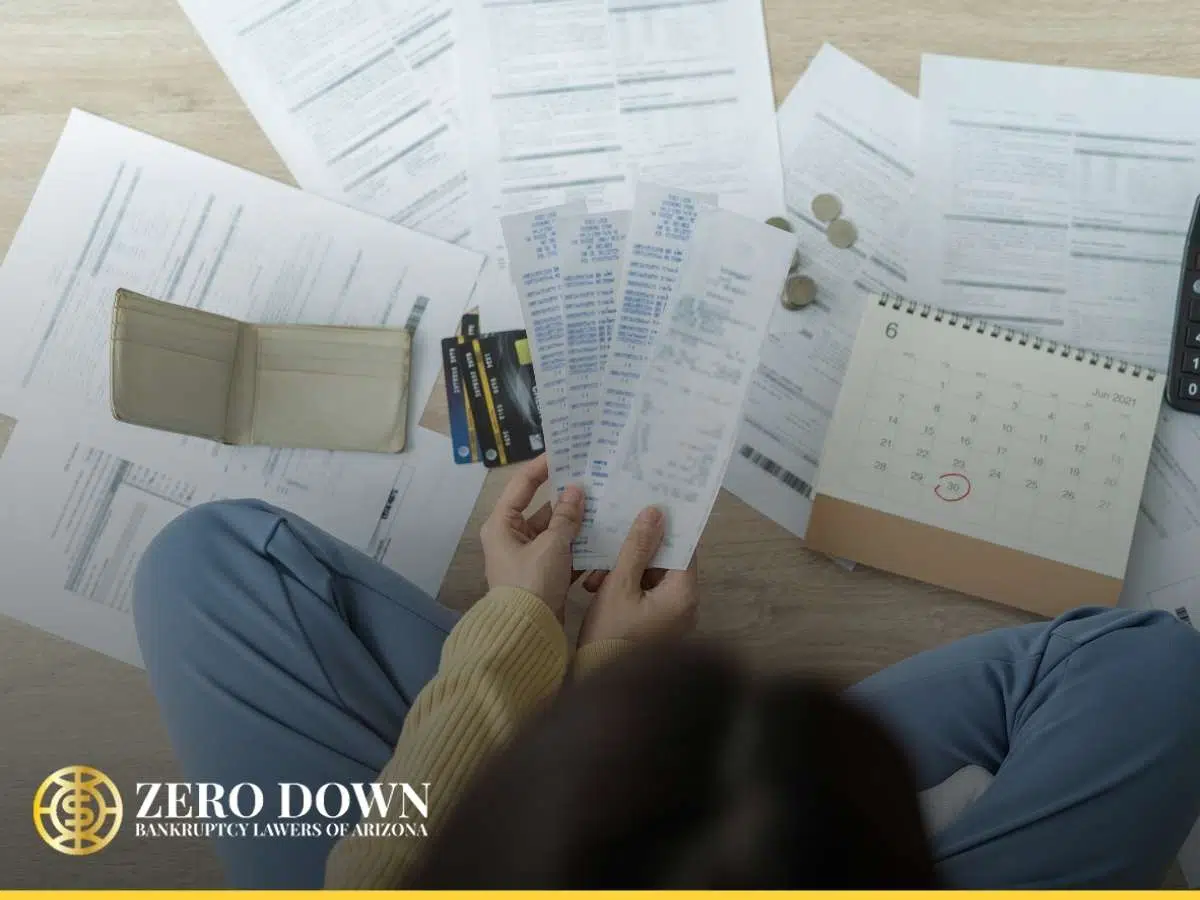Eliminating Tax Debts By Filling For Bankruptcy In Arizona
Especially if you have other debts, the tax debt can feel like a hole that you’re never going to escape. Debts owed to the government can be pursued more aggressively than some other creditors would. If you are feeling trapped by tax debts, filing bankruptcy might be able to help your situation. It can simultaneously help you deal with any other debts that may be weighing you down. To discuss your debt with an experienced bankruptcy lawyer, fill out our online form or call 480-833-8000 to schedule your free consultation.
Tax Debt & Chapter 7 Bankruptcy
Chapter 7 bankruptcy is the most common type of consumer bankruptcy. It’s no wonder why- Chapter 7 bankruptcy can clear away thousands of dollars of unpaid credit cards, utility bills, medical bills, personal loans, and more. Tax debts are among the debts that can be discharged in a Chapter 7 bankruptcy, as long as they aren’t priority tax debts. In order to not be considered priority debt, your tax debt must meet the following requirements:
- It comes from income taxes that are at least 3 years old
- The tax returns were filed at least 2 years prior
- The tax debt was assessed at least 240 days ago
- There was no fraud present
Not everyone qualifies for Chapter 7 bankruptcy. One way to see if you qualify is by comparing your income to Arizona’s median income. Your household size can generally only include a spouse and children under the age of 18. You will calculate your income as averaged over the past 6 months. For 2022, the median monthly income for a household of one is $4,871.83. For a family of 2, it is $6,105.17. For a family of 3, it is $6,592.50. For more information about the median household income for larger families, click here.
If you don’t qualify for Chapter 7 bankruptcy for having a lower income than Arizona’s median income, you might still be able to qualify using the means test. Calculating the means test can be complicated and is best left to bankruptcy professionals. You will use the same average monthly income you used for the median income comparison test. Then, certain regular expenses will be deducted from your monthly income. Examples include your mortgage, student loans, child support, and spousal maintenance. What you have left is your disposable monthly income. If your disposable monthly income is negative or close to zero, you may still qualify for Chapter 7 bankruptcy. Calculate the means test with one of our experienced Arizona bankruptcy lawyers by calling 480-833-8000.
Tax Debt & Chapter 13 Bankruptcy
Chapter 13 bankruptcy can come in handy when it’s time to deal with tax debts for two major reasons. First, you might not qualify for Chapter 7 bankruptcy, so Chapter 13 is your option by default. Second, your tax debts might not meet all the requirements described above, making them priority debts and not dischargeable in Chapter 7 bankruptcy. If your tax debts can’t be discharged, you still might be able to pay them off in a reasonable time frame while protected from the IRS and the rest of your creditors.
Instead of clearing debts away, Chapter 13 reorganizes debts into a payment plan. If you passed the median income comparison test for Chapter 7, your payment plan will last 3 years. If your average monthly income exceeds Arizona’s median monthly income for your household size, your Chapter 13 bankruptcy will last 5 years. Your debt will be divided into four categories and paid off in order: first, your legal and attorney’s fees associated with the bankruptcy; second, your secured debts, or debts with an asset attached as collateral; third, your priority debts, including tax debts that don’t meet the Chapter 7 discharge requirements; and fourth, your unsecured nonpriority debts. Your plan payments will be calculated based on your disposable monthly income, and if you can’t pay off the final category of debt within your bankruptcy’s time frame, those debts can be discharged. So if your tax debt is dischargeable in Chapter 7 but you file Chapter 13, some of it may be discharged without payment at the end of your plan. To learn more, call with your questions for an Arizona bankruptcy lawyer at 480-833-8000.
Can I Discharge Tax Penalties?
If you have tax penalties in addition to your tax debts, you’re probably wondering if they are dischargeable as well. In general, your tax penalties must be at least 3 years old to be discharged by bankruptcy. If the tax debt is dischargeable, the penalty for it will be as well. Your penalties likely aren’t dischargeable if they stem from fraud. If you are unsure about your tax penalties in a bankruptcy, you should discuss your situation with one of our experienced Arizona bankruptcy lawyers. Call 480-833-8000 or fill out our online form to schedule your free consultation.
Is My Tax Refund Safe If I File Bankruptcy?
Each state has its own bankruptcy exemptions, which are limits on how much equity can be protected in certain types of assets in a bankruptcy. Arizona doesn’t allow bankruptcy debtors to use federal exemptions. Unfortunately, there is no exemption that can be used to protect your tax refund in Arizona. You can find a list of Arizona’s bankruptcy exemptions here.
When you file for Chapter 7 bankruptcy, you risk losing your tax refund. Whenever possible, you should wait until you have received and spent your tax refund before filing for Chapter 7 bankruptcy. Otherwise, your trustee can take a portion of your tax refund based on the month in which your bankruptcy case was filed. The trustee might also choose to let you keep your tax refund if it isn’t a significant amount. A bankruptcy lawyer can help you figure out how much of your tax refund will be at risk and strategize when your case should be filed.
Your tax refund may also be at risk in a Chapter 13 bankruptcy. Because a Chapter 13 bankruptcy lasts 3 or 5 years, you can’t time your filing to avoid losing your tax refund. Your trustee should let you keep your tax refund if your plan arranges for 100% repayment of your debts. Otherwise, the trustee will likely take your tax refund to pay your creditors.
Tax Liens & Bankruptcy
When the government places a lien on your property due to tax debts, it becomes secured debt. You will need to pay off the lien if you ever want to sell the asset. Secured debt isn’t dischargeable in Chapter 7 bankruptcy and won’t wipe out tax liens. You may want to consider Chapter 13 bankruptcy because you can pay off secured debt, like a tax lien, while protected from your creditors.
Affordable Arizona Bankruptcy Lawyers
Preparing for bankruptcy includes several complicating factors and tax issues are just the starts of it. Filing on your own could end up costing you in the long term when it comes to tax refunds, case delays, extra costs, and more. Zero Down Bankruptcy Lawyers offers competitively-priced legal representation so that you can be confident about your decision to file. You may even qualify for our ZERO DOWN Chapter 7 payment plan option. To learn more, contact us or call 480-833-8000 to schedule your free consultation today.
Arizona Offices
Phoenix Location:
343 W Roosevelt Street, Suite #100
Phoenix, AZ 85003
Email: [email protected]
Phone: 602-609-7000
Mesa Location:
1731 West Baseline Rd., Suite 101
Mesa, AZ 85202
Email: [email protected]
Glendale Location:
20325 N 51st Avenue, Suite #134
Glendale, AZ 85308
Email: [email protected]
Tucson Location:
2 East Congress, Suite #900
Tucson, AZ 85701
Email: [email protected]










